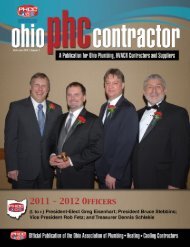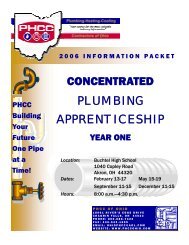RLS Plumbing Co. Robert Schlueter 9835 Lakeview Dr - PHCC Ohio
RLS Plumbing Co. Robert Schlueter 9835 Lakeview Dr - PHCC Ohio
RLS Plumbing Co. Robert Schlueter 9835 Lakeview Dr - PHCC Ohio
Create successful ePaper yourself
Turn your PDF publications into a flip-book with our unique Google optimized e-Paper software.
Bob DunleveyDunlevey, Mahan & FurryLegally SpeakingDepartments<strong>Co</strong>nstruction <strong>Co</strong>ntracts - <strong>Co</strong>ntrolling Escalating <strong>Co</strong>stsMaterial shortages and price escalations are wreakinghavoc on the construction industry. Be it steel, cement, asphalt,copper, or whatever other commodity that is in demand, thepressures of the global economy and the recent jumps in thecost of petroleum based products are making it very difficult forcontractors to enter into fixed-price contracts without absorbingunnecessary risks of financial ruin. Because projects are pricedand bid months or even years in advance of actual construction,the current volatility of the materials market puts a contractorat significant risk when attempting to guess what the purchaseprice of these materials will eventually be. Who should bearthe risk of the volatile and escalating price of materials?Traditionally, the contractor has been required to perform thecontract without relief from escalating costs. But, risk transferto the owner is attempting to be utilized by many savvycontractors – especially now when the cost of materials is goingthrough the roof. Traditional contract principles have beenshown to be very inadequate in according relief to contractorsthrough change orders and this is why risk transfer needs to beconsidered.Developers and contractors are well familiar withcertain techniques for meeting escalating costs such as valueengineering, substitution of materials, strategic advancepurchasing of materials and other such methods. Hand-inhandwith these strategic methods is the need for contractorsto develop, negotiate and incorporate within their constructioncontract provisions the sharing of risk of escalating materialcosts. These types of clauses can take many forms, includingcost-base clauses which seek to compare actual incurred costwith bid cost, and index-based clauses which track and adjustprices based upon numerous existing material price indexes.The general rule of law is that material price increases infixed-price construction contracts are borne by the contractor.<strong>Co</strong>urts have historically taken the view that fixed-pricecontracts are inherently an allocation of risk – “prices go up –bad for seller” – “price goes down – bad for buyer.” Merelybecause performance becomes economically burdensome,it is not sufficient legal grounds to let a contractor out ofperforming. In the absence of specific contract provisions,courts rarely rule a party is excused or entitled to a priceincrease because of unexpected, substantial material priceincreases. However, if material is unavailable, courts are morereceptive to reforming a contract compared with merely when amaterial can be bought at a higher price than expected.The Board of <strong>Co</strong>ntract Appeals and the <strong>Co</strong>urt of FederalClaims traditionally hold that a contractor assumes the riskof unexpected cost in the absence of clauses shifting risk togovernment. But, four basic arguments do exist for a contractorto be excused from performance: impossibility – commercialimpracticability – frustration of purpose – force majeure. Eachof these theories requires a showing of certain facts to meetlegal criteria and these principles seldom meet with favorbefore the courts.The doctrine of “impossibility” permits the party to beexcused if performance has become objectively impossible as aresult of an unexpected event. For it to apply, there must be noway for performance to be achieved, not merely uneconomical.For commercial impracticability, it is not necessary thatperformance be impossible, but it must be extremely costly,time consuming and impracticable. Because the courtsrecognize that this principle could be abused, they have statedthat it is not to be invoked merely because performance hasbecome more expensive than contemplated. For the excuse of“commercial impracticability” to be applicable, the contractormust exhaust all alternative means of performance. Theimpracticability must come from an unexpected change. Arise or collapse in the market is not a justification becausethat is exactly the type of business risk fixed-price contractsare intended to cover. But, severe shortages of raw materialscaused by war, embargo, unforeseen shutdown of a supplysource and the like can excuse performance. “Frustration ofpurpose” is another defense to performance but the parties’purpose of the contract must be almost completely frustratedby supervening events. Frustration must be substantial – notthat the transaction has become less profitable or would sustaina loss. “Impossibility”, “commercial impracticability” and“frustration of purpose” generally require the party seekingrelief to prove an unforeseen event, no allocation of risk forVolume 2008, Issue 3 • OHIO PHC CONTRACTOR 25





